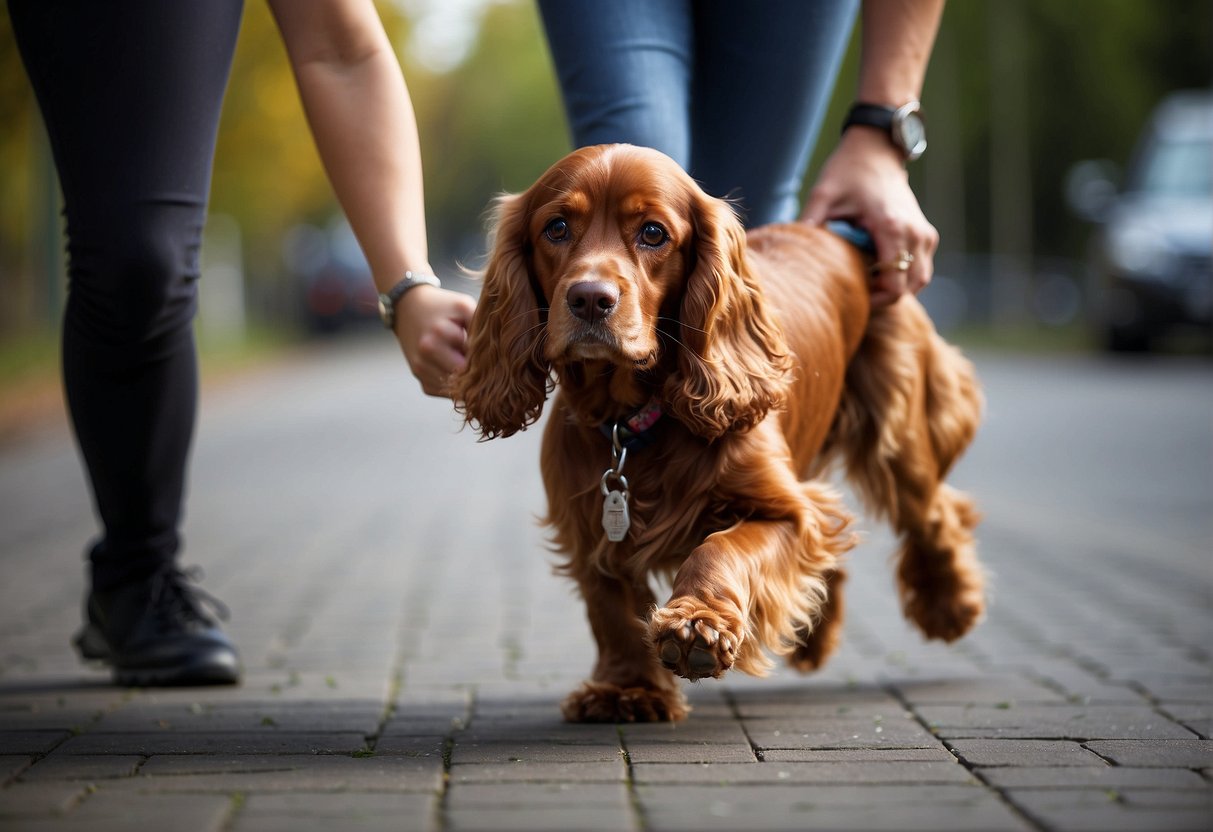Managing joint issues in Cocker Spaniels involves a compassionate and proactive approach.
These affectionate dogs are known for their joyful demeanor and beautiful, flowing coats, but they are also predisposed to certain health issues, including joint pain.
Joint problems can affect Cocker Spaniels at any age and can potentially impact their quality of life.
Recognizing the signs of joint pain early and understanding how to manage these issues can make a significant difference in a dog’s comfort and mobility.

At home, there are several strategies that pet owners can employ to help their Cocker Spaniels maintain joint health and manage symptoms of joint pain.
Keeping the dog at a healthy weight reduces unnecessary strain on the joints.
Regular, gentle exercise supports joint flexibility and muscle strength.
Additionally, there are natural ways to relieve joint pain, such as incorporating anti-inflammatory foods into the diet or using supplements formulated for joint health.
Understanding the underlying causes of joint pain in Cocker Spaniels is as important as the remedies.
Some joint issues are hereditary, while others may develop as a result of lifestyle factors or age.
Owners can create a comfortable environment that minimizes stress on their dog’s joints, tailored to their specific needs.
From the choice of bedding to the selection of toys and activities, thoughtful consideration goes a long way in managing joint problems effectively at home.
Understanding Cocker Spaniel Joint Health

Cocker Spaniels are known for their cheerful and affectionate nature.
However, these adorable dogs are prone to certain joint health issues that owners should be aware of.
This breed may face joint problems such as hip dysplasia, patellar luxation, and arthritis, which can affect their quality of life.
Hip Dysplasia is a hereditary condition wherein the hip joint doesn’t fit together perfectly, which can lead to arthritis or lameness.
Watching out for signs of discomfort during exercise or difficulty getting up can be important for early detection.
- Patellar Luxation involves the dislocation of the kneecap, leading to intermittent lameness or an unusual gait.
This condition can vary in severity and often requires veterinary attention.
Regular check-ups are key as Cocker Spaniels age since the risk of arthritis, painful inflammation of the joints, increases.
Early intervention can include weight management and appropriate exercise, which may help to slow down the progression of joint problems.
By monitoring a Cocker Spaniel’s activity levels and maintaining a healthy weight, they can manage these health issues more effectively.
Appropriate exercise, like swimming, can help strengthen the muscles around the joints without adding stress.
Lastly, it’s beneficial for owners to understand the signs of joint discomfort:
- Hesitance to climb stairs
- Reduced activity levels
- Visible joint swelling
- Stiffness after rest
Staying informed can help ensure that these beloved dogs live happy, active lives despite their predisposition to joint health issues.
Recognizing Joint Problem Symptoms

Cocker Spaniels are prone to various health issues, and it’s essential for owners to identify signs of joint problems early.
Recognizing symptoms like ear infections, eye issues, and mobility changes can be crucial for prompt and effective management.
Identifying Ear Infections
Owners should look for signs of ear infections such as discharge from the ears, redness, or itching.
Cocker Spaniels have long, floppy ears that create a warm, dark environment – perfect for infections to develop.
Regularly checking their ears for any unusual odors or swelling can also help in early detection.
Spotting Eye Issues
Cocker Spaniels may develop several eye conditions like cataracts, glaucoma, or progressive retinal atrophy.
These can lead to symptoms ranging from a cloudy appearance in the eyes to complete blindness.
Watch for changes in the eyes’ clarity or color and for signs they are bumping into objects or unable to track movements, which might indicate vision loss or eye discomfort.
Detecting Mobility Changes
Mobility changes, such as limping, lameness, or lethargy, can indicate joint issues.
A clear sign is a change in their walk, often described as “bunny hopping.” These changes might suggest hip dysplasia or arthritis.
Regular observation of how a Cocker Spaniel stands up, moves around, and its willingness to jump can signal if there is discomfort.
Preventive Care and Maintenance

Preventive care for Cocker Spaniels involves a diligent approach to their well-being focused on maintaining a healthy weight, ensuring proper and regular exercise, and keeping up with routine health check-ups.
Weight Management
Obesity in Cocker Spaniels can lead to a variety of health issues, including joint problems, heart disease, and liver disease.
Maintaining a healthy weight is crucial, and it starts with a balanced diet.
Use a vet-recommended feeding guide and consider the following:
- Measure Meals: Measure your dog’s food to avoid overfeeding.
- Quality Food: Feed them high-quality dog food appropriate for their age, size, and activity level.
Proper Exercise
Regular exercise not only helps prevent obesity, but it also keeps a Cocker Spaniel’s joints healthy.
However, the intensity and duration should be appropriate for their age and health status:
- Daily Walks: Gentle walks each day can keep them active without putting excess stress on their joints.
- Playtime: Engage them in light play that encourages movement without overexertion.
Regular Health Check-Ups
Early detection of potential health concerns can lead to better outcomes. Regular visits to the veterinarian are key.
At each visit, the following should be addressed:
- Vaccinations: Keep up to date with necessary vaccinations.
- Examinations: Annual or bi-annual vet exams help identify problems early.
- Preventative Measures: Discuss neutering, which can prevent certain types of cancer, and regular assessments for early signs of heart or liver disease.
Treatment Options for Joint Issues

Managing joint problems in Cocker Spaniels involves a two-pronged approach: medical interventions and lifestyle modifications to ease discomfort and improve joint function.
Medication and Supplements
For immediate relief, veterinarians often prescribe medications that can include anti-inflammatory drugs and steroids to reduce swelling and pain.
Long-term, owners might consider adding joint supplements to their dog’s diet; ingredients such as glucosamine and chondroitin are beneficial for maintaining joint health and can potentially slow the progression of joint issues.
Advanced Treatment Methods
When basic medications and supplements are not enough, one might explore surgery as a corrective option for severe cases.
Post-surgery, or in less severe instances, physical therapy is often recommended to keep joints mobile and muscles strong.
For home care, providing an orthopedic dog bed can offer better support and alleviate joint pain while resting.
Home Care and Management

When managing joint problems in a Cocker Spaniel, proper diet is crucial.
A diet that maintains a healthy weight can reduce the strain on their joints.
Consider incorporating joint supplements to support joint health.
These supplements often contain beneficial ingredients such as glucosamine and chondroitin.
Feeding:
- Keep meals low-calorie if weight reduction is needed.
- Balanced nutrition is key for maintaining joint health.
- Introduce joint supplements after consulting with your vet.
Exercise:
- Opt for gentle exercise regimes like short walks or swimming to keep the dog active without exerting extra pressure on the joints.
Grooming and Ear Care:
- Cocker Spaniels’ long ears are prone to issues like ear infections, mostly due to dirt accumulation and moisture.
- Regularly inspect and clean their ear canal to prevent yeast infections and ear mites.
- Ensure the ears are kept dry to minimize the growth of bacteria and yeast.
Allergies:
- Be aware of any allergies, which can potentially lead to inflammation and exacerbate joint problems.
- Observe for symptoms and consider allergy testing if needed.
Training:
- Training should be adjusted to accommodate their joint health, focusing on low-impact activities.
- Reinforce commands with positive reinforcement to avoid undue stress on the joints during training sessions.
Maintaining an environment that minimizes stress and physical strain is paramount in caring for a Cocker Spaniel with joint issues at home.
Regular vet checkups will help track the progress of their joint health and modify home care as needed.















